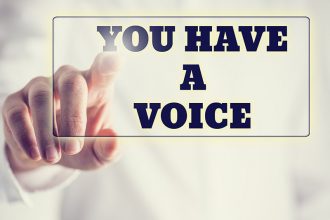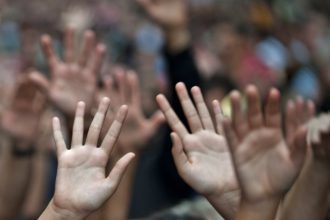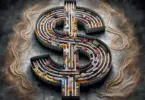By John Reid
Guest writer for Wake Up World
Imagine not having to protest and march over the fundamental right to have our foods labelled… Imagine ending the stranglehold of wealthy corporations over our governments and their agencies… Imagine being able to tear up the treasonous trade deals that are destroying our quality of life… Imagine our elected representatives actually turning to address we the people first and foremost, instead of squabbling with each other and phonying up to the corporate media… Imagine a democratic system that steered the priorities of government back toward enacting the will of the majority. (Quite a change, huh?)
The present systems of governance have failed us! But there is a system which would enable we, the people, to enjoy true freedom and democracy; a life-changing social system that can free us from the criminal power elites who have taken from us for so long.
We are living in very interesting times and things are going to get far more ‘interesting’ as we move through the coming years. If you are reading this then we shall assume you have had enough of what is going on around us and our beautiful planet, and want to change things for the better. This article offers a comprehensive introduction to the concept of Direct Democracy, why it is now necessary, and how we can go about initiating change.
[pro_ad_display_adzone id=”110028″]
The Status Quo
The fact is, we no longer have the luxury of complacency or inaction. The list of what is wrong in our world is a testament to the fact our present systems have utterly failed us. From wars of greed and power to poverty and austerity, from the destruction of our planet to the treasonous giving-away of our rights to increase corporate profits, the future that lays ahead for our children is bleak, at best. Our so-called leadership in all nations have failed us miserably.
But it is all unnecessary. We CAN change it, we CAN heal the planet, and we CAN put the brakes on and not only halt the direction we have forcibly taken, but reverse it. And we the people can have the final say on everything that affects our lives and the land, water and air on which we depend. And to do this, we first have to remember that it is we the people who hold the true power — because no system or society can exist without our consent, our actions, and our energy, all of which give it life.
There are many other disgruntled people doing their best to find solutions. Protests and activism, although making people aware, only seem to get us so far and most people are too busily immersed in trying to earn a wage and raise a family to get involved or, in many instances, even understand the issues. Couple this with constant wars, increasing national and personal debt, and a mainstream media that works to maintain the status quo and cover up the truth of what is really going on around us, and solutions seem to be getting further and further away.
And the establishment is overjoyed that nothing changes for them, or their grasp on power.
Even the US constitution and Bill of Rights, both carefully crafted documents designed to protect the people and U.S. nation from those with nefarious ambitions, have failed to do so. The many executive orders including the Patriot Act (oh the irony) and the National Defense Authorization Act (NDAA) have left both documents in literal shreds.
Senators and members of Congress no longer represent those who elected and fund them, and instead sell out to the highest bidder, to faceless corporations that care not for the nation or people but profit at any cost. Such is the power of the globalists, the central bankers, industrialists and transnational corporations, that Presidents and Prime Ministers simply cannot stand up to them. The TPP and TTIP (among other ‘trade deals’) should make that perfectly clear, and any so-called national leader who binds their people to them is simply a traitor — and there is no other word for them as these deals are acts of treason which destroy our sovereignty and steal our national prosperity.
It should be clear now that a major revamping of the system of governance is desperately needed before the US is a complete shambles. The Founding Fathers must be turning in their graves at what is happening today — but this is not just a U.S. problem, it is a global problem. The power of the globalists have infiltrated every system of governance in every nation. This is no longer a far out conspiracy theory but plain fact.
The Illusion of Democracy
The democracy we believe we have is more illusion than reality.
We have since time immemorial been raised to believe that giving our power away to others is the natural order of things. The divine right of Kings has remained in our collective consciousness for millennia and most of us don’t give a second thought to the learned idea we must have leaders. We run on auto pilot and refuse to question it. But why? In modern times this mindset is proving detrimental to our best interests and very fruitful for those with money and power, the balance of which today is completely out of whack! As a result, people are becoming increasingly frustrated with how our leaders are performing and many of the decisions made at Provincial and Federal levels would never see the light of day if the people had a real voice. But people carry on working hard to raise their families and paying their taxes, believing there is no alternative; that giving their power away to a small minority of ‘representatives’ is the right way; the only way to exist.
Most nations have two or three parties from which to choose in an election and those parties split people into different camps based on certain ideologies which create a divide among the people. But is this divide actually necessary? Are thoughts, ideas and ideologies really mutually exclusive? For example, I may prefer to pay less in taxes but also want the less fortunate in our society to be cared for. In a two party system, one ideal makes me ‘right wing’ or Capitalist, and the other ‘left wing’ or Socialist. But do I really have to throw my lot in with one party, one ideology, which does not really speak for me? Did we as a race evolve this far to exist in one of two camps? How about three camps, or four? Did we evolve to be left wing or right wing, or this ‘ism’ or that ‘ism’? No, if we allowed ourselves to live to our fullest potentials, there would be a ‘camp’ for every single person. We are all unique, are we not?
We are all just people trying to live the best life possible, enjoy the maximum fruits of our labours, and solve ‘issues’ as they arise — for that is all they are, issues to be solved by us and not something that needs politicising, forcing individuals into one of two camps. But, as things are today, many of us end up voting for the party we dislike the least, but which don’t represent our ideologies or how we think things should happen in the big picture. That party wins the election and guess what? They don’t implement the things we voted for, and do implement things we would never have voted for. Sound familiar? Politicians breaking promises they kept just to get elected!
“But it’s just the way it is, we’ve had this system for ever and you ain’t going to change it now!” Well, not exactly. The system we have now is a result of political evolution, but that evolution has not as yet reached its perfected conclusion. However, it is possible to continue this evolution and perfect our systems of democracy. With the right system in place we can ALL be heard, we can ALL participate, we can ALL have our say on how we want our lives to be. We can ALL be our own party, so to speak. We can all express our unique ideologies, and contribute to a smooth running democracy.
So, what could that system look like, and how could it work? And what are the major challenges to getting there?
Political Revolution, or Political Evolution?
It should now be apparent that we cannot trust our lives, our welfare, our nations to those we have enabled with so much power. Our systems of governance have become corrupted beyond repair. This situation has resulted in many believing the only thing that will motivate people to stand up and say “enough!” is when things become so bad that, literally, a revolution will take place.
But what happens after a revolution? Who will be the new leaders? And what kind of system will it be? What will we do to stop the same scenarios of corruption and misdirection happening all over again in the near future? How do we safeguard the people and nation from the power elites who have caused so much grief in our lives, and around the globe?
A full-blown revolution would potentially, and highly ironically, further empower and solidify the establishment of power elites; the reason being that, following the chaos, a new leader may emerge who promises unity, peace, justice and democracy, but who actually increases the police and surveillance state in the name of post-revolution ‘security’. Thus, a revolution in and of itself is no guarantee of a better life or the elimination of those who economically and financially enslave us.
What is needed is not just a new system but a new way of thinking — a new system of governance and finance which is truly equitable, democratic and just. A system in which we all participate and decide how our lives and nations will shape up to be. A system which forever inhibits any small group of wealthy people from controlling our lives and leeching off of our prosperity.
“We cannot solve our problems with the same level of thinking that created them.” ~ Albert Einstein
A New Way of Thinking
It is time for a new way, a new way of thinking, an evolution in thought and belief.
I often talk about this with people, but many cannot let go of the present systems long enough to consider the alternatives. They appear to have blind faith that it will all be fine, that with a little tinkering, a few minor adjustments here and there, the system will once again work for the people. But it won’t. It’s done and dusted. It’s over folks! There are no safeguards within the current system to prevent the corruption and undermining of democracy from happening again and again — and it will, if we don’t make the necessary changes to stop it once and for all.
And that’s the good news, it all begins merely with how we think!
Is it possible to begin implementing changes now? Is there something we can do, something we can believe in, something that can change the direction we are heading, something that works for we the people whose energy actually creates the true wealth of a nation? Is there something we can all agree on that doesn’t involve protesting and marching? Something that doesn’t get people hurt? Something which we can all agree is fair, equitable and — this time — truly democratic?
The answer is a resounding yes!
[pro_ad_display_adzone id=”110030″]
True Direct Democracy
The good news is that today’s technology has made it not only possible, but relatively simple to greatly improve our system of governance and enable every eligible voter to participate directly in the democratic process, and have an equal say on every issue that affects our lives. I am talking about true direct democracy, a system in which voters nominate and vote on all major issues that impact our lives and nation, instead of voting only to choose representatives to make (largely unaccountable) decisions on our behalf.
The biggest problem with our current system is that our so-called representatives have, and continue to, sell us out. It is a political system in which we give our power away — and it has been compromised, thoroughly and completely. But, with the technology we have available today, voting can be carried out electronically via smart phones or computers, with each vote weighted equally, removing the influence of corruptible representatives who currently prevent the will of we the people from being enacted.
How does direct democracy work?
Let’s say we introduce direct democracy today, changing nothing else within your political system. At present, politicians debate the usual issues and vote “on our behalf”. In a direct democracy, their vote is no more powerful than any other voter; the community’s issues are loaded into an app or website, we all vote on them, twice; once to determine the issue’s legitimacy, and if voters agree it warrants a deeper look, representatives research and report back to the public, who vote again to decide whether or not it becomes law. Representatives may give their opinions and recommendations, if they are for or against an idea, and why, but it is we who actually vote on the issue. And that makes them accountable.
Try and cast your mind to how this one difference begins to change things. The politicians will no longer have real power. Lobbying and bribing representatives will cease to exist, because it would be futile, for it is we the people who would collectively agree or disagree, directly voting ideas into law and rendering politicians obsolete. (Thank heavens!) And what is the price to us? Taking a few minutes to vote on a regular basis — that’s it. At the local level it may be once per month. At the regional, county, state and national levels, voting could realistically be done quarterly or 6-monthly, with a window of at least a week for each to be completed.
“I would rather be exposed to the inconveniences attending too much liberty than to those attending too small a degree of it.” ~ Thomas Jefferson
How Can We Make This Happen?
How can we implement this idea? The establishment (including politicians currently in office and the corporations to which they answer) will not want to lose their power and payola. If they really cared about the people they would have implemented this system a long time ago. So forget what the representatives think, this is not about them and their interests. In truth they will never be allowed to implement direct democracy because they are told what to do by their corporate and power elite masters. So rather than wait for permission, this is where we must help ourselves. We must educate ourselves about direct democracy and start talking about it with friends, family and colleagues. An idea whose time has come cannot be kept down and when enough people understand the direct democracy model, and the changes it will bring, the collective consciousness will take over and critical mass will force our representatives to begin adopting it.
As a side note: I believe that a new breed of representatives will run for office on that basis — to help implement direct democracy. From this you will yourself notice the new representatives become less political and more about what is best for their constituents. Remember, the potential for corruption is minimized which will encourage only those with our best interests at heart to run for office, an office that is no longer open to politicization and corruption, but dedicated to providing the best options for the people vote on. These representatives would be more like guardians of democracy or administrators than powerful politicians and they truly would be working for the people who elected them. Their appeal would not be which party they were chosen to stand for but the skillset they offer, and whether they provide solid, unbiased information to aid in our voting choices, and actually answer the questions and priorities of we the people — not just those posed by the bought-and-paid-for corporate media.
Back to kick-starting the process…
Let’s begin at the local level.
As the concept of direct democracy continues to spread, new candidates will begin to campaign on the platform of direct democracy, helping the concept to gradually take root in people’s minds as a genuinely fair and democratic system. To reach critical mass, engendering a culture of accountability at a local level and informing potential new candidates to the concept is important.
Most towns in most places have a council of elected officials whose job is to guard the taxpayer dollar, enact improvements, and make sure the town runs efficiently for the people who live there. Initially, direct democracy can most easily be advocated at a project/local level, whereby organized voters campaign for inclusion in (or control over) decisions relating to government proposals over a certain dollar value, or which diminish the quality of life of any or all residents. Issues would be researched and debated by council and then put to vote by the local residents, altering but not removing the role of local representatives. Although this would require a change to the local law, such a change is achievable, and would give the people final say over decisions that will or may affect them, and importantly, holds the local council representatives accountable for the information they provide to the people and the position (if any) for which they advocate, and why. The role of representative then becomes one of informing and communicating directly with the public, not just with each other or through the controlled media.
Each step in this process creates an important ripple of change. It shows others that other options are available, encourages every day people to engage with the decision making process, and helps to shift the disempowered mindset we’ve been conditioned to accept. It invites people of integrity back into regional politics (people who can deal appropriately with smaller issues that need not involve a public vote, a threshold for which would depend on the community size etc.) while inviting the public to take control of issues that impact their quality of life and bottom line.
And it sends a clear message up the political line: change is coming, one way or the other.
State and National/Federal Level
Ultimately, when direct democracy is implemented at state and federal levels, and democracy is truly taken back into the hands of we the people, all decisions are considered major decisions and should be voted on by the people. As in the local government prototype, the public vote determines all final decisions at state and national levels, and representatives are again accountable for communicating directly to the public. Each vote is considered equal.
Because the element of power is removed from elected ‘representatives’, this system has the potential to evolve, over time, into one where elected government as we know it is no longer required; services of governance could be administered by a rotating panel of citizens who oversee the operation of administrative departments, such as education, transportation and energy governance. In such a case general elections would no longer be necessary, rather citizens could apply to serve a one or two-year term (at most) as guardians of democracy and a rotating, randomized selection would sit on a panel. Their role would be primarily to facilitate the flow of registered issues and information on the public record, the functioning of public voting, and the implementation of those votes.
Questions & Answers
The following are questions I have had put to me about direct democracy, and my answers for them.
First, let me say, there will be challenges in transitioning to a system of direct democracy. Given the way our current system has been manipulated out from under us, driving and implementing any change in systems is going to be an inherently difficult process — even changes that are ultimately positive and rewarding. Not only do our systems have to change, we have to change; the way we think about authority and the role of government has to change; and the way we interact with each other has to change. (But you already knew that, right?)
Human ingenuity is an incredible thing, and over time, we can overcome any and all challenges we face. Sure, it is challenging to envision how things will naturally change, and us along with them. But this is going to be a generational change, and a necessary one; and one day, our children will only ever know the direct democracy model, and they will look back to what we have today in disbelief that we ever put up with such a diabolically corrupt system. Right now, our task is to take those first decisive steps toward taking back our stolen democracies, for ourselves and for future generations.
Electronic voting has in the past been compromised. How can you guarantee security and an accurate vote count?
There are several ways to achieve security and accuracy with electronic voting, and maintaining transparent and accountable regulation is key to making it happen. It also helps to remember, people were initially resistant to electronic banking but now consider it the norm. Whatever the challenges, we are resourceful enough to overcome them as they arise.
How would we be informed about the issues? Are some issues more complicated than some people will understand?
The role of elected officials/representative would include explaining to the public the potential consequences of a YES or NO vote. All issues would be debated and discussed in a public forum (available via broadcast or online) and published on government websites etc. When it comes time to vote, each vote issue will be linked to collated publicly available information and a roundup of the key points ‘for’ and ‘against’.
If there aren’t any politicians in the future, who will come up with new ideas to improve things?
Every voter can propose an idea or issue. We do not need politicians to show us the way — in fact, they have proven they do not represent the people and are actually a hindrance to our shared goals. In a direct democracy, the priorities of governance are nominated by the people. After all, in a truly free nation, everyone is a potential leader (not just the rich and well-connected) and their ideas have as much value, and as much right to be proposed, researched, qualified and voted on by the nation.
If every voter can propose an idea, how do we stop the time wasting of frivolous proposals? What if I proposed free beer for all men between the ages of 21 and 35?
All proposals have to be qualified by the people, removing frivolous proposals from the vote. How this works is that, at vote time, voters are given 2 lists to vote on. The first list is stage one, voting on potential proposals; this is where the people decide if the proposal should be included in the next round of research and debates for the real vote. If a majority decide that the idea or proposal has merit, it is referred to a panel for further research and debate, and their findings reported back directly back to the public in preparation for the real vote; stage two, voting on qualified proposals. As this model maintains, the panel would consist of experts and regular people who sign up to participate in the process for a limited period of time.
What happens if we vote ‘yes’ for an idea which turns out to be a bad thing?
Under our current system, bad ideas are implemented every day, often in the face of public resistance. The difference is that direct democracy draws the focus of policy back to merit, not politics. If a decision made in good faith provides a bad result, anyone can propose to amend or remove it, and the public vote will have its say. And this is an exciting aspect of direct democracy; by trial and error we eventually find stability and equilibrium, the common denominator by which our societies can live in harmony. Because ultimately, we are in control.
It sounds as if direct democracy would give us the opportunities to change whatever we want?
Yes it does, the system is geared toward putting in place the true will of the majority. This is a vast improvement on what we have at present. With direct democracy there is no representative given the power to stand between the people and their collective will; we vote freely on every issue and we propose the new ideas on which to vote.
I like the sound of true direct democracy but how do you propose it can happen? Those within and behind power aren’t willingly going to give up their power…
It’s a sad reflection on our current system of government that we already know they won’t willingly give up their power in favour of a better, fairer model, but would fight against any movement that advocated its implementation. They will use the argument that advocates are nutcases, or dangerous, and reassure us that they know best — But where has their way got us? If you want to see detailed examples of how truly awful the present systems are for the people, please check my website www.theorganiceconomy.ca.
The best way to begin the process of changing to a direct democratic system is to first understand its immense power for the people, and second to talk to friends and family about it, and why it’s necessary. (I usually begin by explaining how we don’t really have democracy, that we don’t really have a choice, that we cannot leave our futures in the hands of corrupt politicians who are selling out everything we have. Most people agree with that premise, and many are angry at how governments do so many things against the will of the people. Then I talk about other options and changes we could make…) Then, as we spread the word, we can also encourage people to write or talk about direct democracy and its merits to their present representatives and councilors at all levels. Talk to them about better models of government that can be enacted within our current infrastructure (you may be surprised how many disillusioned, well-meaning representatives a lower levels of government may be open to serving the public in this way, and how many career politicians show their true colours and gradually begin to vanish from our lives… ) And let them know the current system’s days are numbered. As more and more people do this the pressure begins to build. When the critical mass of those who want direct democracy is reached, new candidates will begin to campaign on that platform and the idea will gradually take root in people’s minds as a fair solution to the current system of government, which most agree is flawed, corrupted or both.
Would a direct democratic system be a socialist system?
No, a direct democratic system would be apolitical and free of all ‘ism’s’. All other known systems of governance are controlled from the top down. They all have a leadership that represents some form of ‘ism’, which ultimately, given power instead of responsibility, forces its will on the people. In contrast, direct democracy requires no ‘leaders’, rather, we all have equal access to the process of democracy, and an equal say in our lives and how our nations move forward.
Are we as a society even capable of voting on important issues? With opinion so often divided, does this give people the power to make poor decisions?
Firstly, the adversarial political system we have today is itself a polarizing force. Remove the force and the division it causes goes away. Moreover, direct democracy will change our ways of thinking about collective decision making — democracy — and in time, it will be our second nature and a welcome part of our lives to consider and vote regularly on major issues, and actively participate in the democratic process. It will take some time for people to get used to the idea that they may actually have a say! But when it comes to dealing with challenging issues, human nature is to be more understanding and less polarizing in the way we think and communicate when we feel we actually have a voice.
Remember, decisions are always up for public review. Of course, there will always be those whose ideas do not coincide with ours but that is the nature of a free society, and is no different from any other democracy. At first there will be many who do not fully understand certain issues, but over time, as we collectively learn to be engaged in the democratic process, and discuss upcoming votes etc., people will naturally become more aware of what is going on and how their vote affects them. People will learn through some trial and error; they will see that some things they voted for were not what they wanted after all, or the results were not what they were cracked up to be, or the decision was made at a time when the public mood was different — and they can propose a vote to modify or withdraw the idea or law.
Over time, equilibrium will prevail and decisions will have to be made less often, as the majority of people are happy with decisions being made, and even more are satisfied with the integrity of the process that got us there.
A Final Word
It is often said “we are the ones we have been waiting for.” Folks, it really is time to take a serious long term look at our situations and grasp the fact that we ourselves must change our ways of thinking, adapt our basic beliefs of what life is and how we want it to unfold. We ourselves are the answer to our issues today and to do so, all we need is to change the system so that we have control instead of a handful of corruptible people who are experts at selling us out.
As Dawn Approaches
‘As Dawn Approaches’ is a novel based on today’s world of diminishing rights and freedoms and increasing surveillance and police powers, projected into the near future. It follows the lives of ‘everyday’ people as they witness their country and lives being taken over by a hidden power, joining the rest of the world which had already succumbed. However, this unseen, unelected, un-appointed ‘power’ made one glaring error in judgement, they underestimated the power of human spirit.
This is the story of a nation that has an idea, an idea for a new way forward, a new system which is truly democratic, fair, just and prosperous, a way called The Organic Economy. Based on these ideas, a ‘movement’ formed over time from every section of society, a movement that would not lie down and surrender to the cabal, a brave movement that would attempt to change the very course of history and never be at the mercy of bankers, corporations and corrupt government.
As Dawn Approaches is available here on Amazon.
Further reading by John Reid:
- Changing Beliefs: The Gateway To Freedom
- True Direct Democracy: The Nemesis of The Global Cabal
- National Banks – Ending the Stranglehold of Usury and the Private Money System
About the author:
John Reid migrated to Toronto, Canada from England with wife and 2 daughters in 1988. John is an Electrician by trade, and author of the free e-book The Organic Economy and the novel, As Dawn Approaches. For more, please visit John’s website The Organic Economy or follow him at Facebook/theOrganicEconomy.
[pro_ad_display_adzone id=”110027″]









